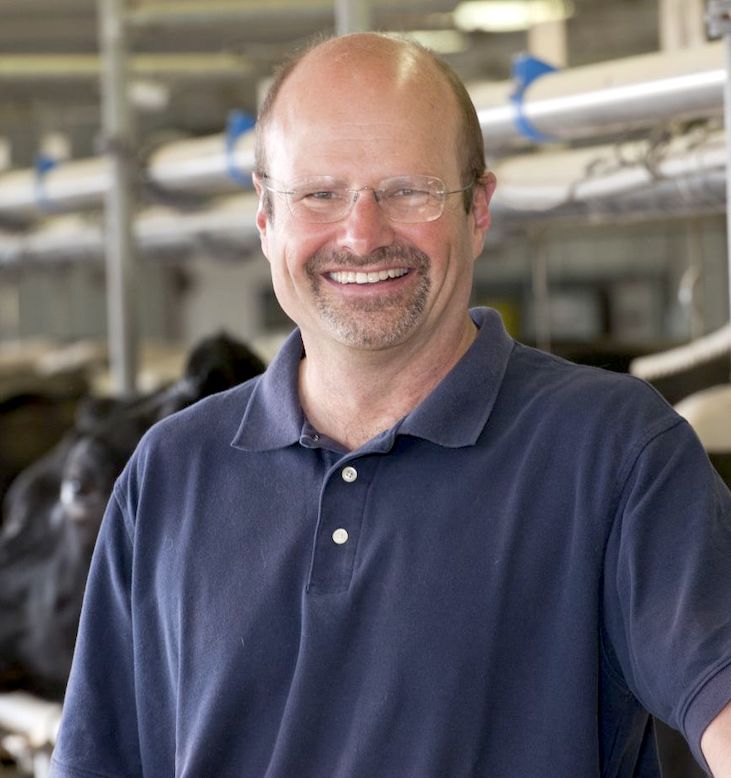
Helping Canadian dairy farmers improve farm sustainability and herd health is the aim of a nearly $4-million project led by three University of Guelph researchers.
Over the next five years, Drs. Stephen LeBlanc, David Kelton and David Renaud, all in the Department of Population Medicine, Ontario Veterinary College, will lead a series of 15 studies that tackle challenges facing Canada’s dairy producers.
The researchers received $2.6 million from the Natural Sciences and Engineering Research Council (NSERC) Alliance program, which supports research collaborations with partner organizations on projects that have real-world impact for Canadians. Four industry collaborators — Dairy Farmers of Ontario (DFO), Dairy Farmers of Canada (DFC), Lactanet and Veal Farmers of Ontario — are providing a further $1.3 million in funding and in-kind support.
“Collaborative research with dairy and veal farmers is a win-win,” said LeBlanc. “Our research team has worked closely with our industry partners to target the questions for which producers need science-based answers.”
Research designed to meet dairy industry needs

“It is truly tremendous that NSERC and dairy industry partners have generously supported this phenomenal alliance between an outstanding team of University of Guelph researchers and the organizations that serve Canada’s dairy producers,” said Dr. Malcolm Campbell, vice-president (research).
“The research and innovation that will be fuelled by this investment exemplify the ways in which U of G thought leaders improve life by addressing real-world needs, while at the same time yielding results of lasting scientific value. It also underscores, yet again, the phenomenal value of the Dairy at Guelph research centre that functions as a platform from which this successful effort will be launched.”
The project responds to several priorities in the 2022–2027 National Dairy Research Strategy, said LeBlanc. The strategy was developed by DFC and its provincial partner organizations, such as DFO, to guide and support research that benefits Canada’s dairy producers and addresses their current and future concerns.
“Innovation requires collaboration and partnership, and we are proud to contribute to this important body of research,” said Murray Sherk, board chair at Dairy Farmers of Ontario. “Dairy producers are early adopters when it comes to on-farm efficiencies so partnering on research initiatives that address challenges is vital to the sustainability of our industry.”
Reducing disease and increasing farm sustainability

The 15 studies will focus on two key themes — mitigating infectious disease and supporting sustainable milk production — and have been selected to complement the team’s research strengths as well as to address emerging and understudied concerns, said LeBlanc.
The team hopes to learn about transmission of bovine leukosis, an endemic disease, and Salmonella Dublin, an emerging concern for the Canadian cattle industry. This foundational knowledge will help the team develop better-informed control methods, which they will test with commercial dairy herds, LeBlanc said.
The researchers will also work with farmers to improve reproductive health of dairy cows and optimize reproductive management using activity monitors.
Other studies will identify the barriers for dairy farmers in implementing evidence-based best management practices and provide them with Canada-specific economic models to support their decision-making in reproductive management.
“We are doing rigorous research with this funding, so we’ll publish and present papers with our findings and train students and post-doctoral researchers,” said LeBlanc. “But a critical measure of the project’s success will be implementation of the results, recommendations, and tools that we put into the hands of Canadian dairy farmers.”
“NSERC Alliance funding is vital to empowering universities and community organizations to create new research and knowledge that directly benefits Canadians,” said Lloyd Longfield, Member of Parliament for Guelph. “The funding announced today for the Ontario Veterinary College will continue to support and strengthen dairy and veal production in Canada.”
